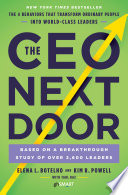

In 'The CEO Next Door', the authors emphasize that character plays a crucial role in determining who becomes a successful CEO. They argue that traits like integrity, humility, and resilience are essential for effective leadership. CEOs with strong character are more likely to earn the trust of their employees, foster a positive corporate culture, and navigate challenges successfully. The authors provide evidence from their research, which shows that character is a better predictor of CEO success than traditional metrics such as education or experience. This insight encourages aspiring leaders to focus on developing their character alongside their professional skills.
Continue readingAnother key idea presented in the book is the significance of decision-making in a CEO's role. The authors highlight that successful CEOs are decisive and able to make tough choices, often under pressure. They discuss the importance of gathering relevant information, weighing options, and understanding the potential impact of decisions on the organization and stakeholders. The ability to make informed decisions quickly is a vital skill for CEOs, as it can significantly influence a company's trajectory. The authors also touch on the concept of 'decision fatigue' and provide strategies for maintaining clarity and focus in decision-making.
Continue readingThe book stresses that effective CEOs are not just individual contributors; they are exceptional team builders. They understand the importance of surrounding themselves with talented individuals and fostering a collaborative environment. The authors explore various leadership styles and how they impact team dynamics. Successful CEOs prioritize communication, encourage diverse perspectives, and empower their teams to take ownership of their work. The book also discusses the balance between authority and approachability, highlighting that great leaders are both respected and relatable.
Continue readingThe authors delve into how successful CEOs handle crises and challenges. They argue that resilience is a defining characteristic of effective leaders. The book provides case studies of CEOs who faced significant obstacles and emerged stronger. The authors outline strategies for crisis management, including maintaining transparency, communicating effectively with stakeholders, and remaining adaptable in the face of change. They emphasize that crises can be opportunities for growth and innovation when approached with the right mindset.
Continue readingA strong vision and strategic planning are vital components of successful leadership, as discussed in the book. The authors argue that effective CEOs have a clear vision for their organization and can articulate it compellingly to inspire others. They explore how successful leaders align their teams around a shared vision and develop actionable strategies to achieve their goals. The book emphasizes the importance of being forward-thinking and proactive in adapting to market changes and emerging trends.
Continue readingThe value of building and maintaining relationships is another significant theme in 'The CEO Next Door'. The authors highlight that successful CEOs invest time in networking and cultivating connections within and outside their organizations. They argue that strong relationships can lead to new opportunities, collaboration, and support during challenging times. The book provides practical tips for effective networking, including leveraging social media and engaging in community involvement to expand one's professional circle.
Continue readingLastly, the authors stress the importance of continuous learning and adaptability for CEOs. They argue that the business landscape is constantly evolving, and successful leaders must be willing to learn and grow. The book discusses the significance of seeking feedback, staying informed about industry trends, and embracing new technologies. CEOs who prioritize personal and professional development are better equipped to lead their organizations through change and uncertainty.
Continue readingThe reading time for The CEO Next Door depends on the reader's pace. However, this concise book summary covers the 7 key ideas from The CEO Next Door, allowing you to quickly understand the main concepts, insights, and practical applications in around 22 min.
The CEO Next Door is definitely worth reading. The book covers essential topics including The Importance of Character, The Power of Decision-Making, Building and Leading Teams, providing practical insights and actionable advice. Whether you read the full book or our concise summary, The CEO Next Door delivers valuable knowledge that can help you improve your understanding and apply these concepts in your personal or professional life.
The CEO Next Door was written by Elena L. Botelho, Kim R. Powell, Tahl Raz.
If you enjoyed The CEO Next Door by Elena L. Botelho, Kim R. Powell, Tahl Raz and want to explore similar topics or deepen your understanding, we highly recommend these related book summaries:
These books cover related themes, complementary concepts, and will help you build upon the knowledge gained from The CEO Next Door. Each of these summaries provides concise insights that can further enhance your understanding and practical application of the ideas presented in The CEO Next Door.